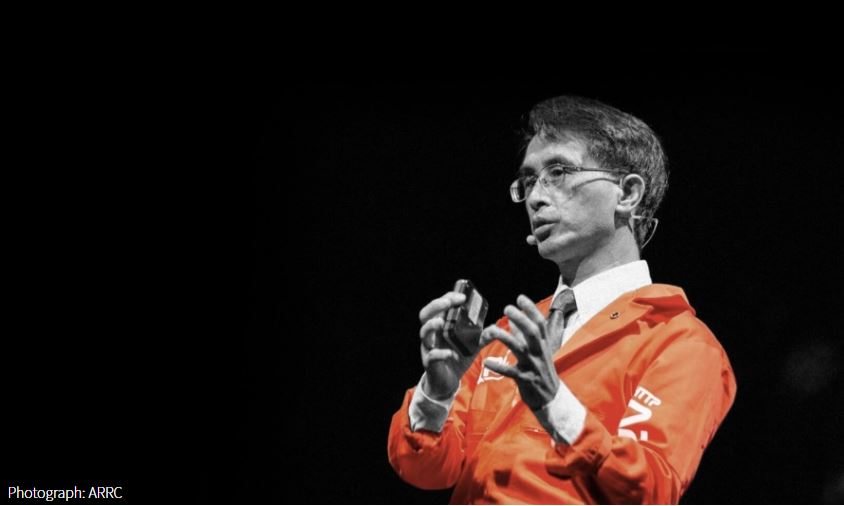Taiwanese professor turns to crowdfunding for rocket launch

Jong-Shinn Wu has a dream of launching a rocket into space, and the people of Taiwan are helping him realize it.
As a professor of mechanical engineering, he has led the Advanced Rocket Research Center (ARRC) at National Chiao-Tung University to launch the first hybrid rocket successfully in 2014. Flying to a height of ten kilometers, HTTP-3S stayed in the air for around ten minutes to carry out measurements and send them back to the ground in real time.
But Wu’s new rocket is different. Instead of a instrument-carrying rocket, HTTP-3A is similar to a launch vehicle that blasts satellites into low-earth orbit, only smaller in size. He expects to launch this rocket next summer. If succeeded, it will be a huge step for Taiwan to the future of sending objects into orbit independently on domestically built rockets.
Now, Taiwan is still dependent on foreign rockets and launchpads to send satellites into space. In June, Formosat-7, the constellation of six satellites jointly built by Taiwan and the US, was launched by a SpaceX Falcon Heavy rocket from the John F. Kennedy Space Center in Florida.
To continue developing and testing HTTP-3A, specifically its upper stage engine that propels the rocket in space, Wu is now seeking financial support from the people who want to be part of the ambitious project.
“You can sometimes be so much ahead of the government and the private sector that they refuse to buy into your idea,” he talks about his crowdfunding attempt in 2015. “But those who are on the same page will find you on crowdfunding platforms.”
Five years ago, Wu has raised around NT$12 million ($408,000) via crowdfunding and later founded Taiwan Innovative Space Inc. (TiSPACE) with his students to enter the crowded market of small satellite launch, the first private company in Taiwan specializing in space technologies.
TiSPACE came under spotlight in February for the proposed launch of Hapith-1, Taiwan’s first domestically built rocket. The liftoff was aborted due to bad weather conditions.
Despite ending up leaving the company in 2018, Wu considers his two years running the company to be invaluable. “Leaving the academia, I had the opportunity to meet with top professionals in the industry of spacecraft production, and that confirmed my belief that Taiwan has the capability to build its own rocket,” he says.
In Taiwan, Wu says there are suppliers of almost all types of components used in rocket construction, from heat-proof materials for engine nozzles to liquid oxidizers. Unknown to the world, they develop technologies that can be applied across the globe.
“This wouldn’t be possible without a robust semiconductor industry,” he adds. “Some materials like the concentrated hydrogen peroxide used for cleaning silicon wafers often come in handy for us.”
What’s more, the island is ideal as a launch site due to its proximity of the equator, where the surface of the Earth rotates at the highest speed, making it easier for a rocket to reach the velocity required to achieve orbit.
Returning to the academia, Wu continues to pursue his dream to put Taiwan on the map of the global space industry, which currently generates more than $350 billion in economic output and is forecast to value at $1 trillion in 2040.
Because of its size, his latest rocket, HTTP-3A, isn’t yet able to send satellites into orbit, but he says its propulsion, avionics, communications systems are all comparable to those of launch vehicles, and if everything goes well with the development, they believe they can propel the rocket to a height of 100 kilometers in 2021.
Two to three years after the launch, we may see the first MIT (made-in-Taiwan) carrier rocket sent to the space, he claims.
“If you have a chance to see a rocket launch on site, you will be moved to tears,” Wu says. “If we can launch rockets on our own, it will be an honor for the people of Taiwan.”
Speaking of the crowdfunding project, Wu believes it is just the beginning of the story. “Our goal is to let everyone around the world know Taiwan can achieve what many believe to be impossible,” he proudly says.
〔Original :Meet Startup @ TW〕
https://meet.bnext.com.tw/intl/articles/view/46773